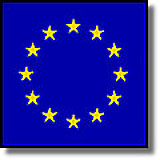
|
|
Is EMU a threatened species?
|
EMU's Future After French Socialist Victory
The former centre-right Government in France made it a priority to cut back public spending and to reduce the size of the public sector, which in France employs about a quarter of the workforce.
This was partly dictated by the need to fulfil the conditions for European Monetary Union and partly by a belief in free market economics as a way of promoting growth, competitiveness and jobs.
The new Socialist-led government wants an agreement with its European partners on softening the conditions for monetary union. But what is EMU and how will it affect Britain?
-
European Monetary Union is the process which will give members of the European Union a common currency, inflation and budget deficit targets and interest rate policy.
-
It was first proposed in 1969, three years before Britain was finally accepted into the Common Market. EC leaders agreed on the goal of economic and monetary union, building on the intentions of the Treaty of Rome, the founding articles of the EU.
-
The goal of monetary union become part of British law when the former Prime Minister, John Major signed the Maastricht Treaty in December 1991. The treaty set the deadline of 1999 for monetary union of the continent's core economies.
-
The Exchange Rate Mechanism was designed to harmonise the different currencies of the continent. It is the necessary first stage before EMU. It was set up in 1979, based on a Franco-German plan adopted by EC ministers in 1978. Britain did not join until October 1990, and was booted out by currency speculators in September 1992 after the Bank of England spent £7 billion trying to prop up the pound.
-
Despite the the victory of the French socialists, City economists believe a single European currency is likely to go ahead.
-
It would be politically impossible to proceed with a single currency in 1999 without France and Germany on board.
-
Britain will probably not join the single currency in the first wave in 1999, but subject to a referendum, could join later on if the project proves successful.
-
If EMU does not go ahead, the International Monetary Fund has warned the world's financial markets would be plunged into chaos, with dire consequences for Europe's economies.
-
The single currency would mean scrapping the pound for the Euro. The new coins and banknotes would be used from Land's End to John O'Groats and UK tourists could use them in countries throughout the "euro zone". Monetary policy (interest rates) would be controlled by a European central bank, probably based in Frankfurt. Supporters of the euro hope it will mean lower mortgage rates.
-
National governments would still retain control of fiscal policy. That means they will set their own levels of tax and expenditure, although they could be fined for over-borrowing.
Jospin Named Prime Minister
Blair Welcomes Socialist Victory
|

